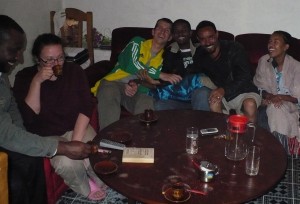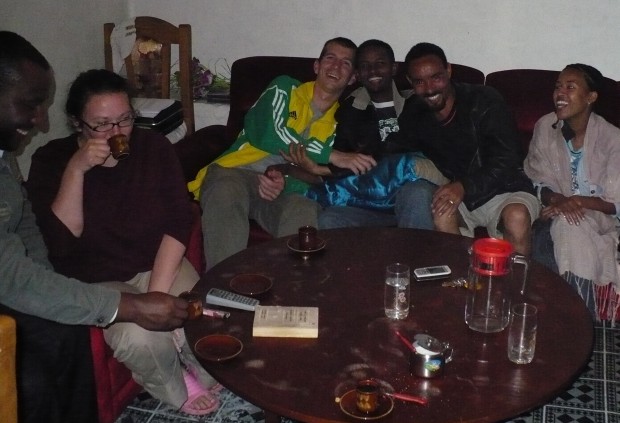Over the past few years we’ve often struggled to cast our vision for ministry in Ethiopia into something more tangible. Being a bit of an introvert I’ve found it difficult at times to put into words what is in my heart and in my head. It is amazing how the process of taking the vision that is inside us and putting it into words can make it more real and allows the vision to take shape into an actual ministry. Recently, our good friend and mentor Terry Waller, director of Water For All International, helped us do this by giving us just a couple of words – incarnational and transformational. The ministries that these words describe are patterned after Jesus’ own ministry.
The Words
Incarnational Ministry – Philippians 2:5-8
Jesus left His home, His high position, and His very good life in heaven to go and live as a servant among poor, needy, and hurting people. Out of an extreme love for these people He developed relationships with them and ministered to all their needs – physical, emotional, and spiritual. This is our first model, to leave our comfort, our luxury, and our “good life” and go live among the poor, needy, and hurting people of this world, make relationships with them and meet their needs.
Transformational Ministry – John 3:3 and 2 Corinthians 5:17
Jesus described it as being born again. Paul said that we become new creations. However it is described, there is a transformation that occurs in our life when we give our life to Jesus Christ. We have witnessed this type of transformation in the lives of dozens of street kids. A transformational ministry uses the relationships that develop out of incarnational ministry to share the life-changing grace of Jesus so that hurting people can go from lives of despair to lives of hope.
As we think of our work in Ethiopia in terms of these two ministry models we can start to put the puzzle pieces together into a bigger picture. We know that to live incarnationally, as Jesus did, means developing relationships and meeting the needs of the poor. We also know that true transformation only comes through knowledge and faith in Jesus, which means evangelism and discipleship. When we phrase it like this these may seem like two very separate things. In fact, many today view these as mutually exclusive goals; either you alleviate poverty or you preach the Gospel. We see them as one and the same. Jesus taught and modeled that they actually fit seamlessly together and that we must do both. If we look at Jesus command when he sent his first disciples out we see that he expected both.
As you go, proclaim this message: ‘The kingdom of heaven has come near.’ Heal the sick, raise the dead, cleanse those who have leprosy, drive out demons. Freely you have received; freely give. Matthew 10:7-8
The power of the message comes through the love that is shown by the messenger.
Putting it into practice:
The question that must be answered is how this will play out for us personally on the field. The first step is to simply go and live among the people of Ethiopia. We will learn their language, live with them and get to know them.  Then we will follow the command to love our neighbors as we love ourselves by responding to their needs. The physical and material needs in Ethiopia are overwhelming and realistically we won’t come close to meeting them all. We have a few skills to help meet the most basic needs – food, water, education – and a large part of our ministry will center around this. However, the point isn’t to alleviate every need; that simply isn’t realistic. The point is to respond to each need with compassion and wisdom, knowing that we are limited and most of these needs will go unmet.
Then we will follow the command to love our neighbors as we love ourselves by responding to their needs. The physical and material needs in Ethiopia are overwhelming and realistically we won’t come close to meeting them all. We have a few skills to help meet the most basic needs – food, water, education – and a large part of our ministry will center around this. However, the point isn’t to alleviate every need; that simply isn’t realistic. The point is to respond to each need with compassion and wisdom, knowing that we are limited and most of these needs will go unmet.
Though we can’t meet all of the people’s needs we do have a way to alleviate much of the suffering that is caused by them. Most often the specific need – sickness, hunger, poverty – is superficial to the lack of love and hope in people’s lives. It is the emotional and spiritual suffering that is most intense. Focusing solely on physical and material needs is like putting band-aids on a cancer patient. Notice how Jesus interacts with the Samaritan woman at the well (John 4: 1-42). He specifically targets the emotional baggage in her life and brings about a spiritual change in her by revealing Himself. The joy and hope that she receives overshadows any of the temporary wants of her life. The real power that we have to alleviate suffering is Jesus Christ.
Our work in Ethiopia is simple. It is following the great commission in response to the two greatest commandments; to love God with everything that we are and to love our neighbors as ourselves. If we do that our mission will be a success.

preach it J2! I’m so thankful to be able to play a small role in this amazing ministry. Thank you for sharing and diving deeper into these 2 words that change lives through the power of Jesus Christ! whoo!!!
What can I say, you have summed it up, if only we could live like this everyday, right where we are. I am so proud to be associated with the J2 family!! My prayers are ‘without ceasing’ for you as you seek to follow
God’s leading to Ethiopia. May HE be your guide, your strength, your comfort, your provider, and most of all THE love of your lives. “….. Be Strong and courageous, Do not be terrified; do not be discouraged, for the LORD your God will be with you wherever you go.” Joshua 1:9 As your mother this gives me great peace.
Brilliant!
Great insight. I think I will start using both these words to describe TFC. So fitting and important for people to understand!